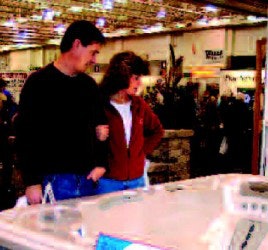
For many consumers , the local home and garden show is a great way to spend a weekend afternoon. In one trip, they can interview roofing contractors, see the latest models of gas grills, choose the variety of petunias they'll plant in their window boxes, learn about a new type of deck cleaner, attend a seminar on identifying the songbirds in their backyards and buy hot tubs.
Whoa, back up. Are homeowners really buying $5,000 to $8,000 hot tubs at their local home and garden shows. The companies that run those shows will tell you, "Yes! Home and garden show attendees are well qualified and ready to buy." But others aren't so sure, and they say retailers should plan to promote their businesses at home shows to generate business in the future, rather than counting on sales that day. Depending on the region and the market, a given retailer's experience probably lies on a continuum somewhere between the two extremes.
The hot tub industry has a history of selling outside the showroom; in fact, Roy Jacuzzi, inventor of the hydrotherapy pump that is often credited with starting the portable spa category, marketed his self-contained, jetted Roman Bath in the late '60s by displaying it at country fairs and housing trade shows.
But nowadays, with dealers investing so much time and money in building impressive showrooms, why would they want to dilute their resources to make appearances at home and garden shows or fairs?
According to American Consumer Shows, a Long Island, N.Y., company that operates weekend home and garden expos at dozens of locations around the United States, there are many reasons to exhibit at shows like theirs. But as with anything else, hot tub retailers must do their homework and decide if a given show makes sense for their particular business.
Here are some reasons to consider exhibiting at a home show, and some tips on making sure your booth rental fee is money well spent.
• The home show has done all the advertising for you. Depending on the show, it may have been advertised in local papers and circulars, on television, radio, billboards and the Internet and through direct mail and point of sale. Of course, exhibitors subsidize this effort with their booth fees, but show promoters can reach far more customers with their efforts than a single retail business could afford to reach by itself.
• Retailers can reach far more — and better-qualified — potential buyers than would walk through their retail stores on a given day. That's the best-case scenario, but it's important to know just who is attending a particular home show. Examine the demographics from the show's last event. Talk to vendors who participated in the last show. Ask some of your best customers if they have attended or would consider attending the show. And keep in mind: just because members of a certain demographic are attending a show, it doesn't mean they plan to buy anything. As one industry insider put it, "The home and garden show is a cheap date!"
• Retailers can demonstrate their chosen products in a hands-on environment and get consumers to touch and interact with their products — consumers who might not otherwise choose to come to their stores. Most consumers are sold as soon as they get their hands on a high-quality item and see for themselves the value and desirability of the product. They can then imagine how it might fit into their lifestyles and from there it's just a short distance to closing the sale. Given the hands-on opportunity, if you choose to exhibit at a home and garden show, make sure you provide an interactive experience. Be sure to have tubs up and running so show attendees can put their hands or maybe even their feet in the warm bubbling water. If you sell hot tubs with audio, aroma, water features or other "sights and sounds," be sure they are running so customers can experience them.
Get The Most For What You Spend On Free Stuff.
Let's face it ; many people who attend a home and garden show are hoping they'll come home with swag. Even if it's just a bumper sticker, a refrigerator magnet or a logo pen, attendees feel like they've had a good day when they leave the show with bags of free stuff. But is it worthwhile for exhibitors to spend a lot of money on freebies. AQUA asked consultant Susan Friedman, known as "The Tradeshow Coach," to share some of her tips for choosing and using giveaway items at shows.
• SET A GOAL: What do you want to achieve with your giveaway item. The home and garden show giveaway should be designed to increase your store's recognition, communicate a message, motivate an action or promote your store. Make sure you chose an item that delivers that goal and has an impact.
• CHOSE THE RIGHT GIFT: With your objective in mind, consider whether you want the item to enhance a theme, convey a specific message or educate a target audience. Remember that the image of your store is reflected in the item, so choose something you'd be proud to carry home.
• ADD YOUR MESSAGE: Is there something that naturally complements your store's brand or marketing message. If you own Tropical Tubs, choose a logo pen shaped like a palm tree. If you sell above-ground pools, an inflatable toy with your company's message might be a good choice.
• SET A PRICE: The price range for show giveaway items is enormous. Quality, quantity and customization all impact the price. Establish a budget for yourself as part of the cost of exhibiting at the home show. You might consider ordering larger (therefore less expensive per piece) quantities of the same item for use at multiple shows, or for other promotions.
• ESTABLISH QUALIFIERS: What must visitors do to qualify for a giveaway item. Some possibilities are: as an incentive for those who stop in for a demonstration or presentation, as a thank-you for providing qualifying information like signing up for a newsletter, or just as a thank-you for stopping into the booth.
• USE A PRE-QUALIFYING SECRET: Giveaways can be used to pre-qualify prospects. One company sends out postcards ahead of the show inviting the recipient to redeem the card for a gift at the booth. They send one card to key customers, another one to hot new prospects (for example, a mailing list from a high-end home builder) and perhaps a third design to a general list. When the cards are presented in the booth, salespeople will already know a little about the potential customer and can use time with the visitor more productively.
• USE A SALES INCENTIVE: Will your giveaway directly help future sales. Consider handing out a discount coupon or a gift certificate that requires the potential client to visit your retail location to collect the gift.
• INFORM YOUR TARGET AUDIENCE: Novel home show giveaways can attract prospects to your booth. Make sure your prospects know about it by sending an invitation with details of the giveaway. Or create a two-piece premium sending one part to top prospects and inviting them to collect the other half at the show.
• MEASURE RESULTS: Plan a way to track the succes s of your giveaway campaign. If it was a redemption item, code it so you'll know it came from the show. Followup might include a question about the giveaway: Did visitors remember the item and did it make an impression.
After the show, critique the giveaway campaign with your staff: Did it draw specific prospects to the booth. Was it eye-catching enough to persuade passersby to stop. Did your customers find it useful or intriguing. Did it project the right corporate image?
There are plenty of giveaways to choose from, so avoid the usual pens, pencils and key chains. Make your premiums work for you by applying these giveaway tips and it will be money well invested.
Susan A. Friedman, "The Tradeshow Coach," is the author of Meeting & Event Planning For Dummies . She works with companies to improve their meeting and event success through coaching, consulting and training. For more information, visit thetradeshowcoach.com Get The Most For What You Spend On Free Stuff den expos at dozens of locations around the United States, there are many reasons to exhibit at shows like theirs. But as with anything else, hot tub retailers must do their homework and decide if a given show makes sense for their particular business.











































